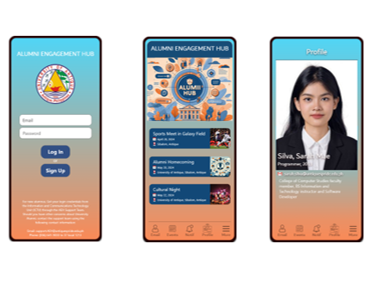Bridging the Gap Between Universities and Alumni: A User-Centered Evaluation of a Digital Alumni Engagement Platform
DOI:
https://doi.org/10.69478/JITC2024v6n002a05Keywords:
Alumni Engagement, User-Centered Evaluation, Alumni Relations, Technology-Driven Platform, Software Quality EvaluationAbstract
Universities face an ongoing challenge in fostering meaningful connections with their alumni communities. This paper presents the development and evaluation of the Alumni Tracer and Engagement Hub, a web-based platform designed to bridge the gap between universities and their alumni. The study employed a comprehensive approach, utilizing McCall's Software Quality Model for technical evaluation during the development and testing phases. Following deployment, a user-centric evaluation assessed the platform's effectiveness in achieving its objectives. This evaluation leveraged the ISO/IEC 25010 model and gathered feedback through surveys and interviews with alumni, administrators, and staff. The evaluation results revealed a strong technical foundation, with high marks for security, self-documentation, code clarity, and user-friendliness (McCall's model). User feedback (ISO/IEC 25010 model) indicated positive experiences with core functionalities like functional completeness, performance, and learnability. However, areas for improvement were identified in the user interface aesthetics, clarity of element purpose, and user perceptions of data security. This paper discusses these findings and proposes recommendations for optimizing the platform's user experience, strengthening data security measures, and ensuring long-term technical maintainability. By implementing these recommendations, the Alumni Tracer and Engagement Hub has the potential to become a valuable tool for universities to strengthen alumni connections and build a thriving alumni network.
References
N. D. Drezner, O. Pizmony-Levy, “I Belong, Therefore, I Give? The Impact of Sense of Belonging on Graduate Student Alumni Engagement,” Nonprofit and Voluntary Sector Quarterly, vol. 50, no. 4, August 2021, pp. 753-777, https://doi.org/10.1177/0899764020977687.
C. Skrzypek, J. Diebold, W. Kim, D. Krause, “Mentoring Connections: Implementing a Student–Alumni Mentor Program in Social Work,” Journal of Social Work Education, vol. 55, no. 3, May 2019, pp. 449-459, https://doi.org/10.1080/10437797.2019.1600445.
Council for Advancement and Support of Education (CASE), “CASE Insights on Voluntary Support of Education,” https://www.case.org/research/surveys/case-insights-voluntary-support-education.
E. Rosenkrantz, “Changing Landscape of Alumni Engagement: Comparative Case Study of Research 1 Institutions with Changing Demographics,” Doctoral Dissertation, Northern Arizona University, May 2023.
J. A. McCall, P. K. Richards, G. F. Walters, “Factors in Software Quality: Concepts and Definitions of Software Quality,” Technical Report, General Electric Company, Sunnyvale, CA, USA, vol. 1, November 1977, https://apps.dtic.mil/sti/pdfs/ADA049014.pdf.
International Organization for Standardization, “ISO/IEC 25010:2011 Systems and software engineering - System and software Quality Requirements and Evaluation (SQRE): Quality models,” https://iso25000.com/index.php/en/iso-25000-standards/iso-25010.
R. S. Mission, “Multi-channel Support and Ticketing Interface for Online Support Management System Platforms”, International Journal of Applied Science and Engineering, vol. 18, no. 4, May 2021, doi:10.6703/IJASE.202106_18(4).006.
K. A. S. Secugal, J. P. Sermeno, N. E. Mistio, “QR-Code Tracking and SMS Notification Transaction Interface for Scholarship Management System,” International Journal of Applied Science and Engineering, vol. 18, no. 4, May 2021, pp. 1-8, https://doi.org/10.6703/IJASE.202106_18(4).004.
E. A. Smith, G. D. Gearhart, M. T. Miller, “Understanding Alumni Relations Programs in Community Colleges,” International Journal of Higher Education, vol. 8, no. 5, October 2019, pp. 176-184, https://doi.org/10.5430/ijhe.v8n5p176.
I. M. Pedro, J. D. C. Mendes, L. N. Pereira, “Understanding alumni-alma mater commitment relationships upstream and downstream,” Journal of Marketing for Higher Education, vol. 31, no. 2, May 2020, pp. 175-196, https://doi.org/10.1080/08841241.2020.1768200
K. Sutrave, R. Godasu, C. Noteboom, “Strategic Use of Social Media by Higher Education to Influence Alumni Engagement,” MWAIS 2020 Proceedings, May 2020, https://aisel.aisnet.org/mwais2020/15.
I. Snijders, L. Wijnia, R. M. J. P. Rikers, S. M. M. Loyens, “Alumni loyalty drivers in higher education,” Social Psychology of Education, vol. 22, April 2019, pp. 607-627, https://doi.org/10.1007/s11218-019-09488-4.
F. Cownie, M. Gallo, “Alumni Gratitude and Academics: Implications for Engagement,” Journal of Further and Higher Education, vol. 45, no. 6, September 2020, pp. 788-802, https://doi.org/10.1080/0309877X.2020.1820457.
B. Bista, A. Shakya, B. Joshi, A. Pokhrel, L. Dangol, M. Kedia, S. S. Baral, “An Alumni Portal and Tracking System,” Journal of the Institute of Engineering, vol. 16, no. 1, April 2021, pp. 7-14, https://doi.org/10.3126/jie.v16i1.36529.
S. Rajini, B. Hari Prasad, A. Upendrasingh, “Alumni Management and Networking System,” in Proc. of 2023 2nd International Conference on Advancements in Electrical, Electronics, Communication, Computing and Automation (ICAECA), June 16-17, 2023, Coimbatore, India, doi: 10.1109/ICAECA56562.2023.10200060.
R. G. Luciano, G. M. Alcantara, R. Bauat Jr., “Design and Development of Alumni Tracking System for Public and Private HEIs,” International Journal of Scientific & Technology Research, vol. 9, no. 06, June 2020, pp. 12-19.
F. Pucciarelli, F. Rattalino, F. Venuti, “Is higher education hybrid-ready or not? An open call for business schools ongoing dual transformation,” in The Future of Business Schools, R. Baldegger, A. El Tarabishy, D. Audretsch, D. Kariv, K. Passerini, W. L. Tan (Eds.), Edward Elgar Publishing, November 2022, pp. 246-260, https://doi.org/10.4337/9781800889224.00027.
O. Jepps, M. Gregory, S. Cresswell, “Engaging Alumni: Remaining Connected, Not Just Reconnecting,” Handbook & Proceedings of Students Transitions Achievement Retention & Success (STARS), 2019, pp. 1-5, https://api.semanticscholar.org/CorpusID:214407871.
E. Mona, H. M. Ranjani, V. Sowmya, S. Sivakumari, “Alumni Social Networking Site,” International Journal of Scientific Research in Computer Science, Engineering and Information Technology, vol. 7, no. 3, September 2021, pp. 467-472, https://ssrn.com/abstract=3913199.
M. McNamee, “Alumni Engagement and Identity: A Case Study on Beliefs and Behaviors,” Philanthropy & Education, vol. 4 no. 2, Spring 2021, pp. 25-50, https://doi.org/10.2979/phileduc.4.2.02.

Downloads
Published
Issue
Section
Categories
License
Copyright (c) 2024 Sarah Mae Rubejes-Silva

This work is licensed under a Creative Commons Attribution-NonCommercial 4.0 International License.



